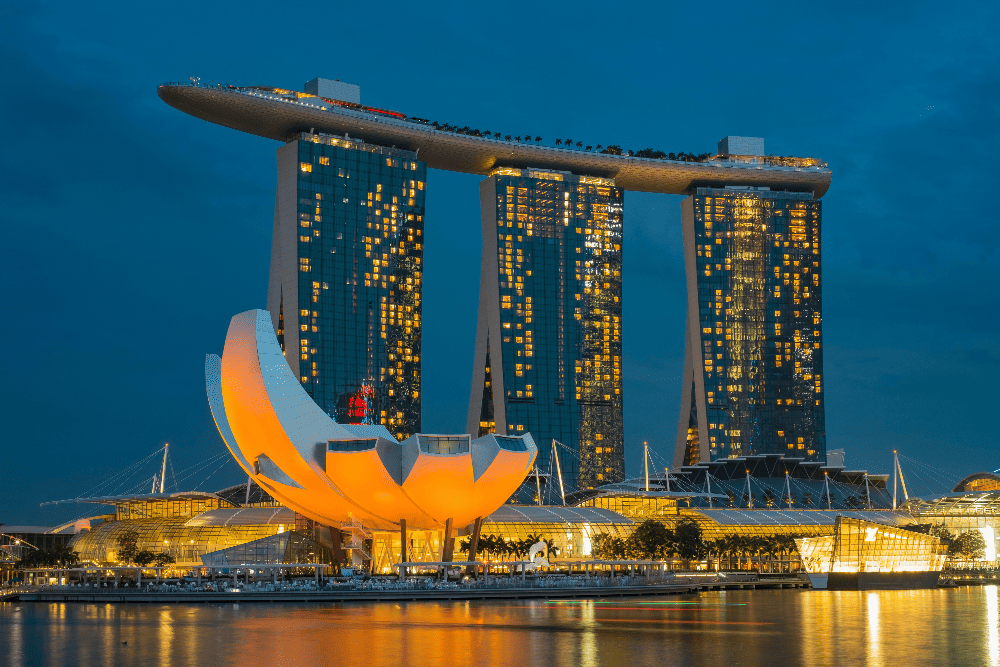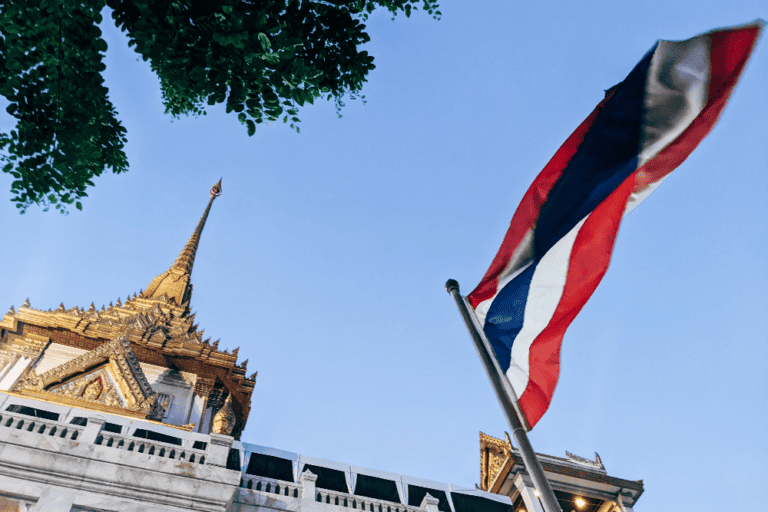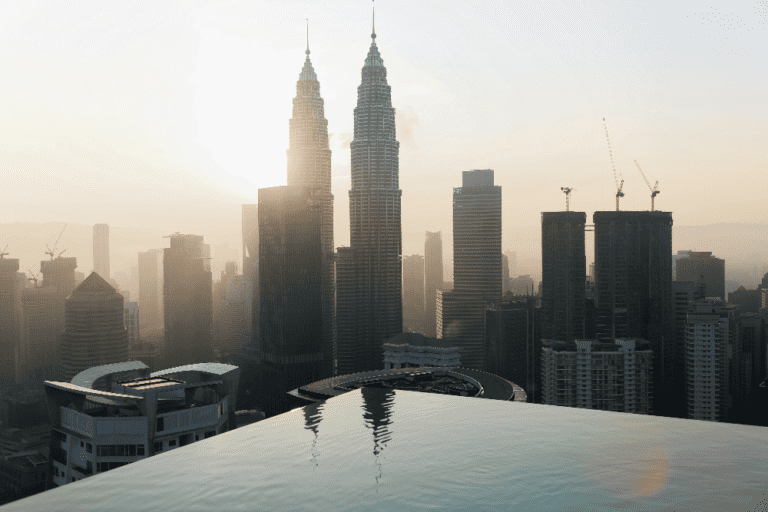No Visa, No Problem: Unique Options for Moving to Singapore as a Digital Nomad Or Remote Worker (2024)
Singapore, the Lion City, roars with a unique blend of gleaming skyscrapers, ancient temples, and a vibrant multicultural tapestry. It’s a city-state pulsating with ambition, efficiency, and a touch of futuristic allure.
But for digital nomads and remote workers, the allure often comes with a question: Can you relocate and stay in Singapore for an extended period without a digital nomad visa?
The answer is certainly yes, but it does come with certain requirements.
In this comprehensive guide, we go beyond the glossy tourist brochures and provide practical advice and valuable information to assist digital nomads and remote workers in successfully navigating the complexities of moving to Singapore.
This guidance is based on current information provided by the government and my own experiences from almost a decade of living and working in Singapore.
What Is Singapore? What Makes It Attractive to Foreigners?
Singapore is a sovereign city-state and island country located in Southeast Asia, renowned for its diverse cultural tapestry, futuristic cityscape, and thriving economy. It’s more than just a place; it’s a unique blend of elements that make it highly desirable for foreigners:
Economic Powerhouse
- Booming economy: Singapore ranks among the wealthiest nations globally, boasting a stable financial system and attractive business environment. This draws entrepreneurs, investors, and professionals seeking career opportunities.
- Tech Hub: The city-state is a global leader in innovation and technology, with a vibrant startup ecosystem and major tech companies setting up regional headquarters. This attracts tech-savvy individuals and skilled professionals.
Efficiency and Modernity
- Clean and Green: Singapore prioritizes cleanliness and sustainability, offering residents and visitors a pristine urban environment with abundant green spaces. This appeals to people seeking a comfortable and healthy lifestyle.
- Top-notch Infrastructure: The country boasts world-class public transportation, efficient communication networks, and modern amenities that make everyday life smooth and convenient. This attracts those who value efficient systems and infrastructure.
Cultural Fusion
- Multicultural Melting Pot: Singapore is a blend of Malay, Chinese, Indian, and Eurasian cultures, offering a kaleidoscope of languages, cuisines, and traditions. This diversity sparks intrigue and fosters a sense of inclusivity.
- Culinary Paradise: From Michelin-starred restaurants to bustling hawker centers, Singapore serves up a vibrant food scene showcasing diverse culinary influences. This attracts food enthusiasts and those seeking new culinary experiences.
Safety and Security
- Low Crime Rate: Singapore boasts one of the lowest crime rates globally, creating a safe and secure environment for residents and visitors alike. This is particularly appealing to families and solo travelers.
- Political Stability: The country enjoys political stability and strong governance, ensuring a secure living environment and fostering confidence in long-term plans.
Strategic Location
- Gateway to Southeast Asia: Singapore’s central location in Southeast Asia makes it a convenient hub for exploring the region, offering easy access to neighboring countries and diverse travel experiences.
- Business Hub: Its position as a global trade and financial center attracts business travelers and entrepreneurs seeking regional connections and international opportunities.
As for me, one of the primary motivations behind my move to Singapore a few years ago was the fact that I had family members who were Singaporean citizens at the time.
Additionally, Singapore offers a wealth of high-paying job opportunities, and I was fortunate enough to secure consecutive positions with two Singapore-based companies, enabling me to establish a long-term presence in the country.
These days, I regularly travel to the country for both personal and professional reasons, having secured remote work assignments with firms headquartered in Singapore.
If you’re a working professional, entrepreneur, or investor, moving to Singapore should definitely be on your radar.
Tips for Moving to Singapore as a Digital Nomad or Remote Worker
To make it explicitly clear, as of January 2024, Singapore does not offer a digital nomad visa or remote work visa for application or acquisition.
However, if, for any reason, you are keen on moving to Singapore and staying in the country for an extended period, there are several potential options available for digital nomads and remote workers like yourself:
1. Use Passports Belonging to Visa-Exempt Countries to Stay for up to 90 Days
Citizens of certain countries can stay in Singapore for up to 90 days visa-free. These countries include Australia, Brunei, Canada, France, Germany, Japan, Korea (South), Malaysia, Netherlands, New Zealand, Norway, Spain, Switzerland, the United Kingdom, and the United States.
Are visitors from visa-exempt countries allowed to do remote work while in Singapore?
Currently, there isn’t a specific rule in Singapore stating that visa-exempt visitors cannot work remotely while staying in the country. But, here’s a caution: before starting any remote work in Singapore, it is essential to consider two crucial factors:
- Personal remote work: If your remote work solely involves connecting with your home country’s company or clients without any engagement with the Singaporean economy or local businesses, it may be considered permissible during your short stay.
- Work involving Singapore: If your remote work involves collaborating with local entities, providing services to Singaporean clients, or generating income within Singapore, this could be considered working in the country illegally and potentially lead to issues with immigration authorities.
To ensure compliance and obtain accurate information tailored to your specific circumstances, I strongly recommend reaching out to the Immigration and Checkpoints Authority (ICA) for further advice and clarification.
To contact the ICA or access the complete list and the latest information regarding visa-exempt countries and their authorized stay durations, please click here.
2. Apply for the Work Holiday Pass (Under the Work Holiday Programme)
The Work Holiday Programme offers an exciting opportunity for eligible students and young graduates to combine work and holiday in Singapore for 6 months.
To apply for a Work Holiday Pass under this programme, you must meet the following criteria:
- You must be between the ages of 18 and 25 at the time of application.
- You must be an undergraduate or graduate of a university in Australia, France, Germany, Hong Kong, Japan, Netherlands, New Zealand, Switzerland, the United Kingdom, or the United States.
- Your university must be recognized by the respective governments of these ten countries or regions.
- For undergraduates: You must have been a resident and full-time student of the university for at least 3 months before applying for the pass.
- For graduates: You must have been a resident and full-time student of the university.
For further details, please click here.
3. Apply for the Work Holiday Pass (Under the Work and Holiday Visa Programme)
The Work and Holiday Visa Programme is designed for eligible Australian students and graduates seeking to work and vacation in Singapore for a maximum duration of 12 months.
To apply for a Work Holiday Pass under the Work and Holiday Visa Programme, you must meet the following criteria:
- You must be an Australian citizen.
- You must be between the ages of 18 and 30 at the time of application.
- You must possess a university degree or have completed the equivalent of two years of full-time undergraduate university study.
For additional details, please refer to this link.
4. Apply for a Work Pass Exempt
You can engage in short-term work activities in Singapore without a work pass for specific eligible work-related tasks.
However, it is important to inform the Ministry of Manpower (MOM) about your intention to come to Singapore under a work pass exemption. Simply submit the notification online upon your arrival in Singapore.
For further details, please click here.
5. Apply for the Singapore Entrepreneur Pass (Entrepass)
Designed for serial entrepreneurs, high-caliber innovators, and experienced investors, the EntrePass is for those looking to operate a business in Singapore that is venture-backed or involves innovative technologies.
Key benefits include the ability to build a life with your family in Singapore, a renewable visa for up to one year, tailored support for startup growth, and integration into a supportive ecosystem.
For more information on the Singapore EntrePass, you may click here.
6. Apply for the Overseas Networks & Expertise Pass
Introduced in 2022, the Overseas Networks & Expertise Pass (ONE Pass) is Singapore’s effort to attract top talent from around the world.
This pass is aimed at individuals with a fixed monthly salary of S$30,000 under an employer for the past year or prospective employer based in Singapore or those with outstanding achievements in certain sectors. The goal is to bring global talent to Singapore, tap into their networks, foster team growth, and enhance industry and workforce capabilities.
For more details on the ONE Pass, you can click here.
While Singapore may not have a dedicated digital nomad visa, these alternatives provide avenues for an extended stay, each catering to specific professional backgrounds and objectives.
Always ensure you understand the specific requirements and regulations associated with each option before making your move.
Moving to Singapore as a Digital Nomad or Remote Worker: Other Recommendations and Final Thoughts
Out of all the places I have lived in Southeast Asia, Singapore stands out as the ideal destination for working professionals. Its widespread use of English in business and everyday life simplifies work and daily activities.
Beyond language convenience, Singapore boasts clear and transparent laws. The government is dedicated to consistently improving regulations, ensuring fairness, equal opportunities, and fostering business and individual growth.
However, these benefits are not without their trade-offs. Singapore maintains strict enforcement of its laws, with severe consequences for violations. This is particularly evident in areas such as employment, labor, immigration, and tax regulations.
If the previous options I shared do not apply to your situation, there are two viable choices for a long-term stay in Singapore: applying for a pass through a local sponsor or seeking employment with a Singapore-based company. Both options can be pursued while residing outside the country.
1. Work for a Singapore-Based Company
As I mentioned earlier, my journey of moving and settling in Singapore for the long term was made possible through consecutive employment with two esteemed Singapore-based companies.
If you find yourself working within a limited budget or unable to apply for an investor or entrepreneur pass just yet, this option is undoubtedly the most practical. Fortunately, Singapore offers opportunities for individuals in various professional careers to seek employment within its vibrant market.
Once hired, your employer can apply for one of the following work passes that aligns with your qualifications:
- Employment Pass (EP) – Designed for foreign professionals, managers, and executives. Applicants need to earn a minimum of S$5,000 per month and pass the Complementarity Assessment Framework (COMPASS).
- S Pass – Offers flexibility to employers seeking to hire skilled workers who may not meet the criteria for an EP, subject to a quota.
Additionally, Singapore-based employers can apply for other passes on behalf of employees, including:
- Work Permit for performing artiste – Allows foreign performers to work in public entertainment venues such as bars, hotels, and nightclubs.
- Training Employment Pass – Enables foreigners to undergo practical training for professional, managerial, executive, or specialist roles in Singapore.
- Miscellaneous Work Pass – Designed for eligible foreigners engaged in short-term work assignments, such as seminar speakers, religious workers, or journalists.
2. Apply for the Personalized Employment Pass (PEP)
Once you’ve obtained an EP through your Singapore-based employer, you have the option to apply for a PEP.
The PEP is designed for high-earning EP holders and overseas foreign professionals. Unlike the EP, it is not tied to a specific employer, providing greater flexibility and autonomy in your employment arrangements.
Here are some key benefits of obtaining a PEP:
- Versatile Job Scope: You can typically work in any sector. However, certain professions like medicine, dentistry, pharmacy, architecture, and law require additional registration procedures in Singapore.
- Job Mobility: If you change jobs, you don’t need to re-apply for a new pass. Simply notify the MOM about the job transition.
- Job Search Period: You can stay in Singapore for up to 6 months continuously without employment, allowing you ample time to search for new job opportunities.
For more information, click here.
3. Apply for a Pass Sponsored or Submitted by a Citizen or Pass Holder
If you have a spouse or relatives who are citizens, permanent residents, or pass holders in Singapore, you can explore the option of obtaining a long-term pass through them. Typically, the passes you can apply for include:
- Dependant’s Pass – This is for spouses and children of eligible EP or S Pass holders.
- Long-Term Visit Pass – This is for parents, common-law spouses, step-children, or handicapped children of eligible EP or S Pass holders.
If you plan to work in Singapore as a Dependant Pass or Long-Term Visit Pass Holder, you may consider applying for the following:
- Pre-approved Letter of Consent – This allows eligible Long-Term Visit Pass (LTVP/LTVP+) holders who are spouses or children of Singaporean or permanent residents to work in Singapore.
- Letter of Consent for ICA-issued LTVP/LTVP+ holders – You can apply for a Letter of Consent to work in Singapore if you are an LTVP or LTVP+ holder who is the spouse or unmarried child of a Singaporean or permanent resident.
- Letter of Consent for Dependant’s Pass holders who are business owners – You can apply for a Letter of Consent to work in Singapore if you are an eligible Dependant’s Pass holder who wishes to operate a business.
- Work passes for holders of Long-Term Visit Passes issued by ICA – This is for foreigners married to a Singaporean or permanent resident, or parents accompanying a child who is studying in Singapore. If you hold an LTVP issued by ICA, you can work in Singapore only if you obtain a work pass.
For the most comprehensive and current list of work passes provided by the MOM, click here to access the complete information.
In summary, moving to Singapore as a digital nomad or remote worker without a specific visa category requires thorough research and preparation.
By familiarizing yourself with Singapore’s lifestyle, exploring alternative visa options, securing suitable accommodation, navigating transportation, and addressing common challenges, you can facilitate a smoother and more fulfilling transition.
Additionally, as mentioned earlier, it’s advisable to verify with the ICA regarding the permissibility of conducting remote work while in the country. As the saying goes, it’s better to be safe than sorry, especially when visiting a foreign country.
Overall, My Personal Recommendation Is This…
If your goal is a long-term stay in Singapore and you’re a working professional, I highly recommend seeking employment with a Singapore-based company – just as I did.
While this option may restrict your freelancing opportunities, I can attest from personal experience that it’s worthwhile, particularly for establishing connections, honing advanced skills and knowledge, and embracing professional life in a modern and progressive Southeast Asian country.
Alternatively, if you have the experience and resources, you might also explore the option of relocating to Singapore as an entrepreneur or investor, offering greater flexibility and more opportunities.
In any case, I wish you the utmost success in your journey, and I hope that your move to Singapore paves the way for further achievements.
If you’re interested in discovering other Southeast Asian countries suitable for digital nomads or working professionals, check out my blog article titled “7 Best Asian Countries To Visit As A Digital Nomad In 2024.“
Disclaimer: The information and opinions expressed in this blog post are for informational purposes only and are not intended to be construed as professional advice. Please consult with a qualified professional before making any financial decisions, traveling, or purchasing a product or service. This information is also based on personal experiences and/or research at the time of writing, and new information and updates may be available on the topic being discussed. Please conduct further research before making any decisions.


















